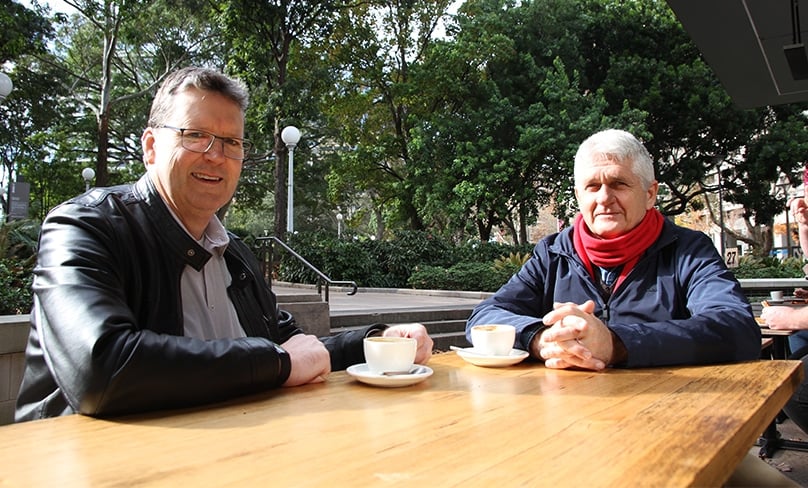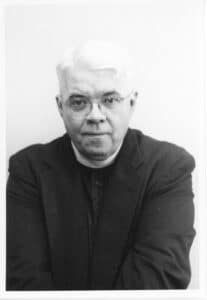
The day before he entered detox, Tim Paul finished off most of a case of beer and contemplated starting on a second. Late afternoon shade had already crept into his northern suburbs flat.
“I had a window of 20 minutes to walk to the bottle-o before it closed but I thought if I go and get another case I’ll just be drinking myself through to the morning,” Tim told The Catholic Weekly.
“So I stayed home and left that last one in the fridge.”
That one act of courage and a three week stay at the Northside Clinic (now called Ramsay Clinic Northside, a purpose-built mental health facility in St Leonards) gave Tim the break he needed from his constant drinking and daily cannabis habit.
It’s also when he was introduced to a twelve-step recovery program.
Tim was “virtually unemployable” and suffering chronic pain from two car accidents which had severely disrupted his late teens and early adulthood (he was the passenger both times) when he entered those clinic doors 17 years ago.
He was also still grieving the death of his younger brother, Adrian, who had died in childhood. Now in his 50s, Tim says making that break with his demons saved his life, but that only God gave him the strength to do it.
“I’d had enough, but God got me sober and has kept me sober,” he said.
Since last year he’s found deeper healing in a mutual support group with fellow Catholics on the same recovery journey.
***
Through his own personal struggles, Bill Wilson, the main author of the original twelve-step program, Alcoholics Anonymous, believed that alcoholism was a medical condition which could be relieved through a spiritual experience, in community with fellow-sufferers.
Since AA began in 1935, the principles have been since adapted and integrated successfully into therapeutic services for other addictions and problem behaviours, including problem gambling, pornography addictions, drug addictions, and eating disorders.
One 2020 study found that people in a twelve-step facilitated recovery program had higher rates of continuous abstinence over months and years compared to other treatments, including cognitive behaviour therapy.

The first three steps involve the person admitting their powerlessness over their addiction and therefore their whole life, realising that only a higher power can restore health and sanity, and making the decision to turn their will and life to the care of God “as we understood him.”
Next is a program of self-examination, asking for forgiveness and help, and making amends. The final steps are about continuing prayer and meditation and helping others with the knowledge gained through this spiritual awakening and reformed way of life.
Whether Wilson knew through experience, divine revelation or both, his twelve steps intuit that of all the afflictions of mind and body, addiction carries an additional burden of spiritual suffering.
Christian mystics have long known that what most needs healing in a person is the anxious craving for, or inordinate attachment to, that which is not God.
And that the path to freedom and happiness in life on Earth and for eternity is a holistic transformation of the person through pure self-giving love, aimed precisely at that wound.
It’s a transformation that usually takes a lifetime of gradual ever-deepening layers of healing, much like that which the twelve steps facilitate and which Wilson also intended to be followed for the rest of a recovering addict’s life.
Fr Ed Travers MSC, the former spiritual director of the Seminary of the Good Shepherd and a long-time supporter of Alcoholics Anonymous, says that the twelve steps have been called North America’s greatest contribution to spirituality.
He believes the program was divine in origin and that the faith aspect, with its trustful expectation of personal transformation and healing through God’s power, was its greatest strength.
“Really it was a divine revelation that Bill Wilson received,” Fr Travers told The Catholic Weekly.
“But while the origins of the twelve steps are in Alcoholics Anonymous, sometimes they are unfortunately diluted in ways which don’t honour its origins.
“Nor are they particularly helpful to people who don’t really want to be transformed.”
AA founder Bill Wilson thought the 8th century monk St Boniface helped him to write the twelve steps.

And his Jesuit friend and mentor, Fr Edward Dowling SJ, was amazed at AA’s spiritual depth and similarities to the spiritual exercises of St Ignatius Loyola.
According to his biographer, Dawn Eden Goldstein, Fr Dowling saw in AA an attitude he didn’t find in other temperance literature, which “typically bore down upon alcoholics with warnings about the sinfulness of their behaviour.”
Instead he thought it prompted genuine self-examination, conversation and surrender to God.
“This is one of the most beautiful things that has come into the world. But I want to warn you that the devil will try to destroy it,” the Jesuit priest said of the twelve steps.
***
Today, members of twelve-step programs are encouraged to trust in a higher power “as we understood him,” and to continue the practices of their own faith outside meetings, which prohibit discussions about issues that could ignite controversy, including politics or “sectarian religion.”
Tim Paul says that today his twelve-step program on its own helps him up to a point, but that his sobriety journey and spiritual life were somewhat unhappily separate.
He always had a deep Catholic faith, praying every night during his long years of recovery—even when he stopped going to Mass at Sacred Heart Mosman, where he once served as an altar boy.
Last year he saw a notice in his parish bulletin about the Calix society, a movement that helps Catholics integrate their faith with their twelve-step addiction recovery.
Enfield parishioner Kevin Smith wrote the notice to find support for a local unit of the lay-led international outreach, which is also open to non-Catholics and those who want to pray for people caught by addiction.
He introduced a Calix unit to the Archdiocese of Sydney with the permission of Bishop Terence Brady in 2021 and is convinced that it is a desperately-needed way to proclaim the Gospel in an addiction-fuelled society.
With Our Lady of Recovery and Venerable Matthew Talbot as its patrons, Kevin says the beauty of Calix is it allows members to support each other while gathered around the Eucharist with all of the richness the Catholic faith has to offer, including awareness of the Holy Trinity, the possibility of a deep personal friendship with Jesus Christ and the help of the saints.
Five Catholics founded the Calix society in 1947 in Minneapolis, naming their group after the Latin word for chalice, because they wanted to substitute “the cup that sanctifies for the cup that stupefies.”
While staunchly committed to AA, they wanted the additional support of fellow believers with whom they could share a lived experience of their Catholic faith.
Calix’s three-fold aim is to support a person’s commitment to abstinence from any means of addiction, spiritual development and personal sanctification (or as we’d say it today, growth in holiness).
Members meet weekly in person or online for prayer and mutual support and also regularly for spiritual activities including Mass and preached retreats by a priest chaplain.
The movement is small but growing in Australia with interest spreading through word of mouth across Sydney parishes and the country (people can join the weekly Zoom meeting from anywhere).

“We claim our identity as a child of God, which is different to recovery programs where you say, ‘I’m Kevin Smith and I’m an over-eater, or an alcoholic or whatever it is,’” Kevin said.
“We don’t think of ourselves in terms of our addiction but in terms of our relationship to God and I think that difference in identification is very important to people of faith.”
Tim is now a member, adding Calix commitments to his recovery program ones, and says it supplements his twelve-step program with spiritual growth.
“I find that in recovery programs people are quite reluctant to talk about God and Jesus as such, while in the church a lot of people are reluctant to talk about alcoholics or addicts,” he said.
“So Calix is like an in-between and unites those two factors back together.”
For information about the Calix Society in Sydney or how to start a new Calix unit email [email protected]
